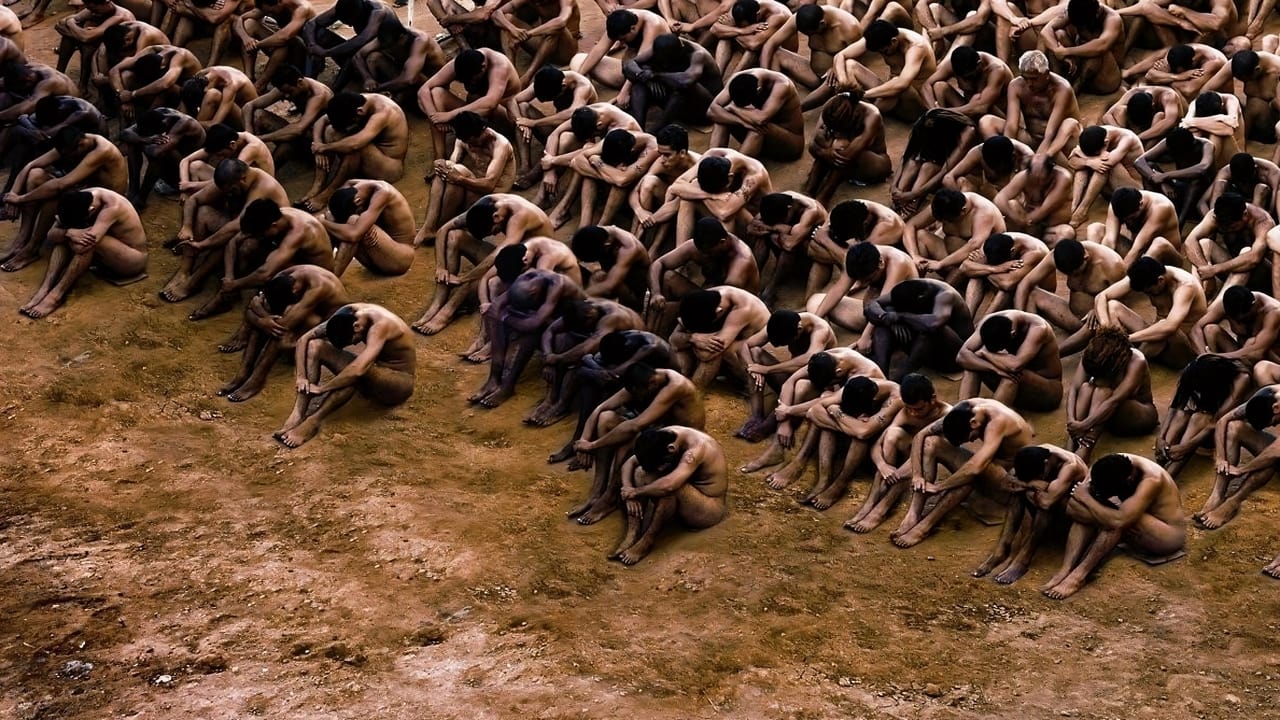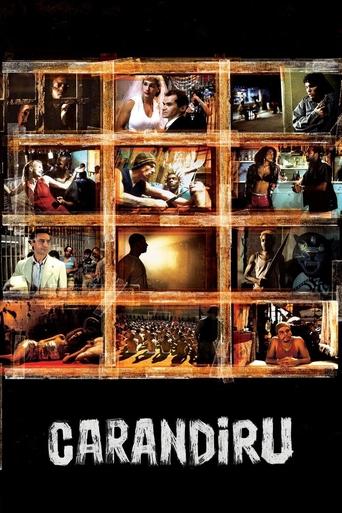

Seen through the eyes of the prison doctor, Dráuzio Varella, this is his version of events taken from his book Estação Carandiru, and the innocent massacre of the guilty.Told in several short fables and sown together into the fabric of the last remaining days of the prisoners in block Pavilhao Nove, this is an account of the build-up to one of Brazils most notorious prison riots in modern history.Filmed in the prison itself before its demolition in 2002 and built in 1956 with its mass population of around 7000 inmates, made initially for the tinier amount of some 3000. Carandiru was never going to be a holiday camp, with its toil of constant hard drug use and the need for safer sex that the prisoners are perpetually being told. AIDS is rife here, be it via drugs or sex, and the violent life that has to be adapted to survive; no one is getting out clean, let alone alive.Slowly unthreading itself as a movie of human connections, Carandiru Penitentiary may be a holding pen for the sinners of Third World poverty, but their stories are typically international. As with each perspective, we are woven into each predicament and, possibly, led to believe that most are victims and victimised rather than perpetrators of crime.It is in these stories that have us empathising their plight and it can be all too easy to dismiss the fact that with every prisoner inside, it is inevitable, that there are victims' on the outside. It is also known that a large amount inside Carandiru was jailed without trial or lawful judgement. However, this is different, this is no ordinary colony, Carandiru is a self-run compound, run from the inside, and with its own rules and punishment; break the law and you end up inside, break the rules and you may never see the outside again.Extremely realistic language and its violent and unforgiving claustrophobic environment drives Carandiru along and is given the grace and respect of a highly talented team. Hector Babenco, whose career also undertakes prison movies such as Kiss of the Spider Woman (1985) and Pixote: A Lei do Mais Fraco (1981), brings together one of the best cast seen for this type of genre. Rodrigo Santoro as muscular Lady Di, the charming and charismatic transsexual in love with tiny and likable Gero Camilo as No Way, who when eventually released wants to become a doctor. There is hope and dreams here, but in the light of day despair and misery are what walk these dark and destitute corridors.Carandiru with it inevitable climax is both tense and mesmerising and at times sympathetic, why, even if some had committed crime, did some have to pay with their life this way? This unfair and totally unjust execution of unarmed men is nothing more than butchery; this punishment certainly does not fit the crime.
... View MoreOn October 2, 1992, a riot broke out at the Sao Paolo House of Detention in Carandiru, Brazil. By the end of that day, 111 prisoners lay dead, the victims of the riot police who stormed the facility and brutally massacred them - even after they'd surrendered their weapons. Perhaps the most striking aspect about Carandiru is that it doesn't hit us over the head with its subject matter - at least not initially, that is. For roughly the first two-thirds of its nearly two-and-a-half-hour running time, the film focuses on the lives and struggles of the prisoners, as seen through the eyes of the compassionate doctor whose book on the subject served as the basis for the film. Without passing moral judgment, Dr. Drauzio Varella, who has been sent there mainly to help stem the spread of AIDS in the facility, listens sympathetically to the stories the men tell regarding the crimes they committed (mainly murder) which led to their incarceration (these we see acted out in numerous flashback sequences). Although the prison is tremendously overcrowded and drug use and disease run rampant through the corridors, the conditions don't appear to be quite as harsh or hellish as we might have expected them to be before seeing the movie. For one thing, the men seem to be treated rather decently by the guards - who seem to exist in surprisingly small numbers, actually - and the prisoners appear to have more freedom to walk around and interact with one another than we are used to seeing in American prisons (or, at least, in movies about American prisons). In fact, so much time is spent exploring the relationship problems between the men in their prisons and their loved ones on the outside that Carandiru often feels more like a "novela" set behind bars than a gritty depiction of life in a human hellhole.But all that changes in the last half hour of the film after the riot has begun and we see the prisoners gunned down in cold blood, many of them while cowering in their cells. It is a brutal and terrifying display of raw, inhuman savagery, one that far surpasses anything we have seen perpetrated by the prisoners themselves. However, writer/director Hector Babenco (along with co-authors Fernando Bonassi and Victor Navas) does not attempt to sanctify or glorify the convicts either, for much of what they do to their fellow human beings is not too many moral steps removed from what the riot squad members eventually do to them. Although the filmmakers' sympathies clearly lie with the prisoners, who are at least presented to us as flawed, three-dimensional human beings, he is not afraid to show the evil side of these men when he needs to as well. The acts of violence that the prisoners perpetrate on their victims and each other are conveyed by the filmmaker with a dispassionate efficiency and awe-inspiring swiftness that are indeed chilling. As a drama, Carandiru could have benefited from a bit of tightening in its earlier stretches, for the film feels a trifle unfocused and meandering at times. Still, by concentrating so intently on the everyday minutiae of these men's lives in prison, Babenco certainly helps the characters to become more real for the viewer, thereby intensifying the sense of loss when the tragedy occurs. Blessed with a large and gifted cast, Carandiru offers a long, sometimes touching, sometimes painful look into a world and an event that would otherwise have remained hidden from the eyes of the world.
... View MoreBrazil is a country of contrasts, and this movie show that perfectly. The same person that can kill somebody without thinking it twice can be nice and gentle at very the next moment. Been in Brazil has this feeling, you may expect violence and danger, but you may get 99% of the time generosity and happiness. An, well, when you put 8000 man in the space of 4000, and they manage to create a micro-universe with there own rules, that works better than the world outside, it just can be in Brazil. Plenty of humor, humanity and honestly, this movie is superior to City Of God, just because it has a positive, optimist message regarding that'111 or so prisoners died in the 1990s' as Alexdffy point out above, showing a lot of respect for human life. Wightly recommended for open minds, that can see the person beyond the criminal...and not criminal to.
... View More"Carandiru" is a prison flick which takes the audience behind the walls and into the halls of an over crowded, dilapidated detention facility in Sao Paulo, Brazil. Unlike the typical Hollyweird version of prison life, you'll see a panoply of unusually happy and gregarious inmates who seem to have the run of their pavilion living in sweaty cells with open doors, many of the comforts of home including surf boards, TVs, plenty of drugs, civilian clothing, etc. all seemingly coping well with prison life until the end when a riot erupts. Part of this long 2.5 hour flick centers on a physician and wanders via flashbacks into the lives of some key inmate characters showing us how they managed to end up in the joint. The balance is a tedious tale of the ups and downs of inmate life from a program to stop the spread of AIDS to a gay marriage to a stabbing to lots of small talk to the final riot, etc. Well cast and adequately shot with the real deal for the prison location, this colorful flick has it's upside. On the downside, however, budget constraints were evident in poor effects, emotional investment is difficult at best, and what story there is seems trite and lacking focus. I found myself completely bored with it at the 2 hour mark. Recommended only for those interested in prison life south of the border who don't mind subtitles. (C+)
... View More